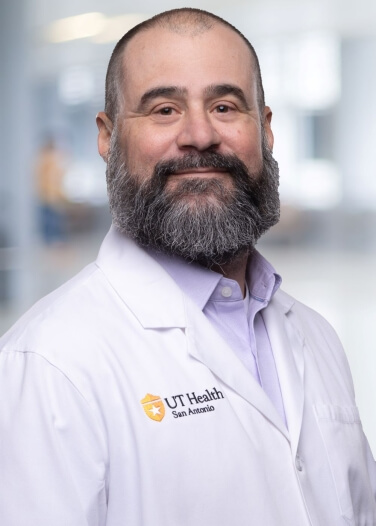Contacts: Steven Lee, UT Health San Antonio, (210) 450-3823, lees22@uthscsa.edu
Monica Ramos, Bexar County, (210) 335-2742, Monica.Ramos@bexar.org
Content contributed by Sandra Zaragoza, Andrea Rochat
SAN ANTONIO, Nov. 6, 2024 – Bexar County awarded The University of Texas Health Science Center at San Antonio (UT Health San Antonio) three grants totaling $9.9 million in federal coronavirus relief bill funding to improve access to health care and create a more equitable and resilient community.
Money from the legislation, known as the American Rescue Plan Act (ARPA), locally will support further recovery from the COVID-19 pandemic in addressing addiction from substance use, behavioral health and long COVID.
Bexar County selected UT Health San Antonio’s Be Well Institute on Substance Use and Related Disorders, a statewide system of substance use and mental health services, for two, two-year grants totaling $7.6 million to support local substance use treatment and peer recovery support services. And Health Confianza, a countywide multilevel health literacy initiative of UT Health San Antonio, will receive a two-year, $2.3 million grant to address long COVID and health literacy challenges.

“This funding is a lifeline for individuals in Bexar County who are struggling with homelessness and substance use disorders,” said Jennifer Sharpe Potter, PhD, MPH, vice president for research at UT Health San Antonio and founding director of its Be Well Institute. “Too many people are unable to get the care they need due to limited access, fragmented care and stigma. With this support and the partnership of local organizations, we can bring compassionate, evidence-based services right to our community, ensuring no one is left behind.”
For Health Confianza, the Bexar County grant comes on the heels of the Promising Practice award from the National Association of County and City Health Officials (NACCHO) for its innovative approach to improving health outcomes in underserved, under-resourced communities in San Antonio. Health Confianza collaborates with organizations, health professionals and the community to reduce health inequities using health literacy strategies. A few of the key benefits of health literacy include improved health outcomes, increased ability to navigate the health care system and lower health care costs.

“This grant will enable us to empower community members to take charge of their own physical and mental health through our team of dedicated community health workers, said Jason Rosenfeld, DrPH, MPH, associate professor at UT Health San Antonio and co-director of Health Confianza. “At the same time, Health Confianza’s work will help to increase the efficacy and coordination of services of health and social service agencies in Bexar County. When you improve health literacy, you improve the well-being of people living in Bexar County.”
The effects of the pandemic
Congress passed ARPA in 2021 to address the economic and public health impacts of COVID. More than five years after the start of the pandemic, Americans still are experiencing its broad effects, especially those in vulnerable populations with barriers to health care.
Be Well Institute is using its funding to deliver two critical programs aimed at addressing substance use and recovery support in Bexar County. In collaboration with Corazón San Antonio, Be Well Institute is launching a Mobile Medical Team to meet the urgent need for substance use treatment among individuals experiencing homelessness, led by project director Tara Karns-Wright, PhD, MS.
This initiative combines Be Well Texas’ expertise in addiction care with Corazón’s trusted outreach services, providing in-field care, addiction treatment and comprehensive coordination to enhance access to vital health services for this vulnerable population.
Additionally, the funds will enable the launch of the Bexar County Community Recovery Support Services initiative in collaboration with community partner Unity Recovery, with Potter as project director. This project will establish the county’s first recovery community organization and recovery community center to offer peer-led recovery services for individuals facing substance use and mental health concerns, including those at elevated risk of experiencing an overdose.
Operating seven days a week, the center will provide peer recovery support services to individuals and family members, while also expanding the workforce to increase access to peer support services and improve long-term outcomes across the community.
The pandemic also highlighted the health disparities vulnerable communities face, such as poverty, housing instability and lower health literacy, which lead to higher rates of chronic diseases and worse health outcomes.
With Bexar County’s funding, Health Confianza and its main partners — Southside Collaborative, South Central AHEC (Area Health Education Center), WestCare Foundation and YWCA San Antonio — plan to expand health literacy training and programming into 12 high-priority ZIP codes in Bexar County. In keeping with ARPA goals, Health Confianza will also focus on long COVID, chronic illness, and mental health education and training.

It is estimated that one out of every five people who have COVID can go on to develop long COVID.
“Long COVID is now a recognized chronic illness, and our understanding of it is growing,” said Melanie Stone, DrPH, MEd, assistant professor of family and community medicine at UT Health San Antonio and co-director of Health Confianza. “Research has shown that it can trigger other issues that our communities already struggle with, such as diabetes and heart issues. By making systemic health literacy improvements, such as equipping organizations to provide better access to long COVID and preventive health education and services, we are helping individuals achieve enhanced well-being for themselves and their families.”
The University of Texas Health Science Center at San Antonio (UT Health San Antonio), a primary driver of San Antonio’s $44.1 billion health care and biosciences sector, is the largest academic research institution in South Texas with an annual research portfolio of $413 million. Driving substantial economic impact with its six professional schools, a diverse workforce of more than 8,500, an annual expense budget of $1.46 billion and clinical practices that provide 2.6 million patient visits each year, UT Health San Antonio plans to add more than 1,500 higher-wage jobs over the next five years to serve San Antonio, Bexar County and South Texas. To learn about the many ways “We make lives better®,” visit UTHealthSA.org.
Stay connected with The University of Texas Health Science Center at San Antonio on Facebook, Twitter, LinkedIn, Instagram and YouTube.
The Be Well Institute on Substance Use and Related Disorders at UT Health San Antonio is a comprehensive, low-barrier system of care that provides compassionate, evidence-based treatment for substance use and related mental health concerns across Texas. Through its hybrid clinic offering virtual and in-person services, a statewide provider network of more than 140 community partners and wraparound services like peer recovery support, the institute reduces barriers to treatment and supports recovery. It also leads cutting-edge research to advance treatment and conducts workforce training to disseminate best practices. Funded by federal and state sources, the institute is dedicated to expanding access, reducing stigma and improving care for individuals and families affected by substance use disorders. Go to bewelltexas.org.
Founded in 2021, Health Confianza is a collaborative, multilevel public health initiative aimed at creating a more informed, confident and healthier community. Through health literacy programs designed to help people make health decisions, we are increasing access to and utilization of health information and services. In keeping with its mission, Health Confianza, which is housed at UT Health San Antonio, has engaged with thousands of community members and provided support and training to numerous nonprofit agencies and clinics. In 2024, Health Confianza received the Promising Practice award from the National Association of County and City Health Officials (NACCHO) for its innovative approach and the strides it has made in improving health literacy in underserved, under-resourced communities in Bexar County. To learn how to get involved, visit HealthConfianza.org and WellnessCultura.org.


